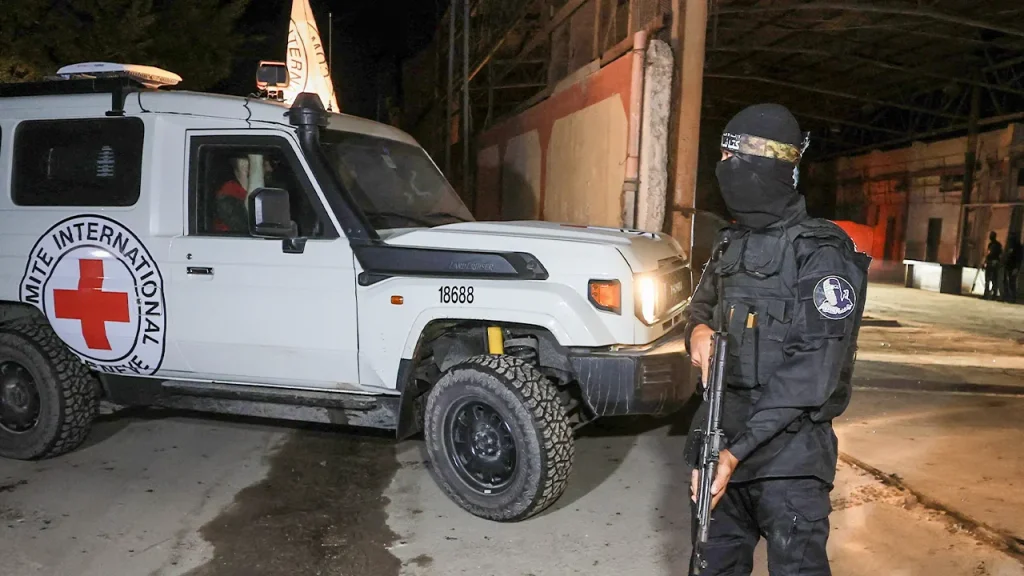Red Cross Facilitates Return of Hostage Remains to Israel Amid Ongoing Crisis
In a somber development Thursday, Israel announced that the Red Cross has successfully transferred two coffins containing the remains of deceased hostages from Hamas custody in Gaza. The International Committee of the Red Cross retrieved the coffins from a designated meeting point in central Gaza and transported them to Israeli Defense Forces (IDF) troops stationed in the region. This transfer marks another small step in the painful process of bringing closure to the families whose loved ones were taken during attacks on Israel.
Prime Minister Benjamin Netanyahu’s office confirmed the transfer, stating that “All of the hostages’ families have been updated accordingly, and our hearts are with them in this difficult hour.” The Israeli government emphasized that “The effort to return our hostages is ongoing and will not cease until the last hostage is returned.” This commitment underscores the emotional and political significance of recovering all hostages—both living and deceased—as a national priority for Israel. The IDF reiterated its demand that Hamas relinquish the remains of all hostages still being held, highlighting the ongoing tensions surrounding this humanitarian issue.
This latest development follows Tuesday’s return of remains initially believed to be a new recovery, but which were subsequently identified as belonging to Ofir Tzarfati, whose body had actually been recovered in 2023. Some of Tzarfati’s remains had previously been returned to Israel in March 2024, and Hamas had released photos of his body in August. His family expressed profound anguish at having to reopen their son’s grave multiple times, saying: “This is the third time we have been forced to open Ofir’s grave and rebury our son. The circle supposedly ‘closed’ back in December 2023, but it never truly closes. Since then, we have lived with a wound that constantly reopens, between memory and longing, between bereavement and mission.” Their statement poignantly captures the recurring trauma experienced by families caught in this tragic situation.
If the latest two coffins are confirmed to contain the remains of previously unrecovered hostages, there will still be approximately eleven deceased hostages whose remains have not been returned to Israel. Among these may be two American citizens, Itay Chen and Omer Neutra, whose families continue to wait in agonizing uncertainty. To date, Israel has received the remains of fifteen out of twenty-eight deceased hostages, including Aryeh Zalmanovich, Master Sergeant Tamir Adar, Staff Sergeant Tal Haimi, Suntaya Akrasi, Ronen Tommy Engel, Eliyahu Margalit, Uriel Baruch, Staff Sergeant Tamir Nimrodi, Eitan Levi, Daniel Peretz, Yossi Sharabi, Guy Illuz, Bipin Joshi, Inbar Hayman, and Sergeant Major Muhammad Al-Atresh.
The return of hostage remains represents a complex humanitarian dimension of the larger conflict. For the families involved, each return brings a mixture of grief and relief—grief at the confirmation of loss, but relief at being able to provide proper burial and begin the mourning process according to their traditions and faith. The Hostages and Missing Families Forum has been advocating tirelessly for the return of all hostages, working to keep public attention focused on those still unaccounted for while supporting families through the emotional turmoil of waiting or receiving devastating news.
As this situation continues to unfold, international organizations like the Red Cross play a crucial intermediary role between the warring parties. Their humanitarian mission enables these limited exchanges to occur even as broader peace negotiations remain stalled. For the families of the remaining hostages, both living and deceased, each day brings renewed hope for news and the possibility of reunification or proper burial. Meanwhile, Israeli officials have pledged to continue providing updates “as necessary,” acknowledging the public interest in these developments while respecting the privacy and dignity of the families most directly affected by this ongoing tragedy.















